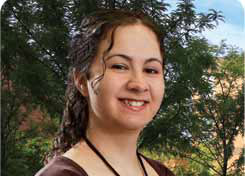"It took a while to commit to surgery, but I am so glad I did it."

If a universal solution to weight management existed, then the billions of dollars we spend annually on weight loss in this country should have shrunk our nation's waistline.
What the failed fad diets have shown is that there is a lot of misinformation and there is no 'one size fits all' when it comes to weight loss. "Pursuing a healthy lifestyle that promotes weight management has to be tailor-made for each person," says Earl Noyan, MD, bariatric surgeon at RWJUH Hamilton’s Center for Weight Loss.
"Look at your challenges. What's holding you back from obtaining a more ideal weight?" asks Noyan. "Sometimes the issues are physical and emotional to you, but you cannot find the right solution without addressing your personal barriers."
Call for a Lifeline
If you do not know where to start, need more information or better motivation, attending one of the monthly support groups Noyan offers can help you establish the goals that are right for you. So can visiting a physician.
"You have to set up a plan, but that can be overwhelming in itself. A good physician will help. We don't just do surgery. Sure, that's an option for some. We can also open the doors for a whole support team — dietitian, peers and sometimes other specialists are needed."
Noyan advises basing your goals on reasonable, sustainable weight loss. A doctor can be especially helpful in choosing your target weight and accommodate any health conditions, such as diabetes, heart disease or chronic pain that may affect your weight-loss plan.
It's about B-M-I
"About a third of adults are considered obese, with a body mass index (BMI) over 30. Many more are overweight (BMI of 25+)," says Lisa Dobruskin, MD, a specialist in treating obesity. "The more extra pounds you carry, the more extra help you may need. Losing even 10 percent of your body weight can have a significant impact on your overall health. But over the long term, you have to focus on your BMI and for some people, that means losing half or more of their body weight.
Medically managed weight loss programs, like RWJ Hamilton's Shape for Life run by Dobruskin, or support groups, help you tackle the underlying causes of your weight problem with the goal of safe, steady weight loss. When medical management doesn't — or simply cannot — solve the problem, surgery may be an option. For some people, if they don't have weight-loss surgery, they cannot manage their health. "Heart disease, high blood pressure, stroke, diabetes, sleep apnea are real medical issues that make obesity one of our most significant health challenges," adds Dobruskin.
Is Bariatric Surgery for Me?
Surgery can restrict the amount of food people can eat or absorb, enabling them to lose large amounts of weight when they've been unsuccessful in the past. As you make that decision, consider these questions:
What is your BMI?
A measure of weight-to-height ratio, your body mass index can show how much extra weight you are carrying (unless you are exceptionally muscular). If your BMI is more than 40, or if it is more than 35 with an accompanying health problem such as diabetes or high blood pressure, you may be a candidate for surgery.
Have you tried to lose weight?
To qualify for surgery, you must have tried unsuccessfully to manage your weight through diet and exercise.
Are you prepared to change your life?
Surgery doesn't cure obesity, but for many people it does make significant weight loss possible for the first time. You will need to commit to frequent doctor visits, support groups and behavior modification after the surgery.
"I have my old life back," says Nicolette, after losing 50 pounds following bariatric surgery. "It took a while to commit to surgery but I am so glad I did it." Over a few years, Nicolette struggled to lose weight and contemplated surgery on and off. "I had this insatiable appetite. I would eat and still feel hungry so I would keep eating." Then Nicolette's doctor diagnosed her with type 2 diabetes. "That was it. I have a family history of this disease and I have relatives who have had infections and lost their sight. I didn't want that for myself. I tried to diet and exercise but diabetes makes it harder to burn fat. Talking to Dr. Noyan gave me hope. I lost some weight before the surgery. Then after I had the procedure, the recovery was good and the weight finally started coming off." Nicolette cautions that her success is due to adopting a new way of life. "This is not a magic bullet. Surgery makes it possible but I had to change my habits. Honestly, I wasn't sure I could do it, but Dr. Noyan's nutritionist made the difference, teaching me how to lose weight while getting the right nutrition, using foods that I like." "I'm just ecstatic. The diabetes is gone. I'm not fighting depression. And when I go to a store, I can find clothes that fit. I still have about 20 more pounds to lose, but it's happening." |